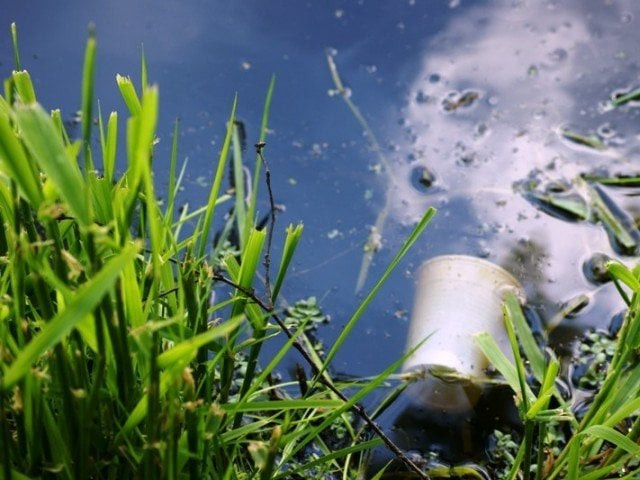Citizens get sewage-fed vegetables in twin cities
People flagrantly grow and irrigate produce with toxic waste alongside Nullah Leh

Cultivation of vegetables irrigated by toxic sewage water on a 21km long stretch of land alongside Nullah Leh and River Soan is a regular occurrence since the last five years.
These vegetables, fed by highly contaminated water present in the waste produced by the twin cities, are being raised in a systematic manner and sold to the residents of Islamabad and Rawalpindi.
While the Punjab Food Authority (PFA) sometimes destroys these crops, their interventions are too few and far between to prevent a bulk of these vegetables from making their way to the public and causing stomach diseases, polio and even cancer.
Moreover, the PFA only lays waste to the crops and hardly ever take action against the ones responsible for growing these toxic vegetables; no challans are made, no cases are registered and rarely any of the perpetrators are fined a nominal sum.
The mafia involved in this business has hired several pushcart vendors who collect produce from these ‘farms’ and sell them on the streets of the twin cities at slightly lower rates than the market price.
Coriander, mint, salad greens, spinach, potatoes, beetroots, and radishes are cultivated on this strip of sewage-fed land, with the vegetable patches spread over a range of five to 25 kanals. These farms are set up in areas on the confluence of Islamabad and Rawalpindi, such as Chakra and the low-lying areas of Nullah Leh comprising Pirwadhai, Dhoke Dalal, Khayabane Sir Syed, Dhoke Rata and Jhanda Chichi besides places alongside River Soan.
Small drains have been dug to obtain water from Nullah Leh and 10 rainwater sewerage drains of the cities to irrigate these vegetable farms. Some people have even installed suction pumps to suck foul-smelling sewage from the sewers for irrigation purposes.
These crops grow by leaps and bounds and are ready to be harvested within a couple of months after cultivation. Mint and coriander crops are available round the year.
Muhammad Basit, a farmer associated with this business, says that unemployment drove him to this avenue. “We have to use sewage water to irrigate our farms as there are no provisions for rainwater,” he told The Express Tribune.
Another farmer Nabi Khan says that he has acquired the farmland on rent. “We do use sewage water, but we cover the mouth of the drain to ensure that only water goes into the farm and all impurities stick to the cloth,” he added.
Vendor Ayaz Khan said that it was more convenient for him to source produce from these farms than the wholesale markets. “I purchase these vegetables Rs2-3 cheaper than what I get from the mandi, and it’s closer to home too,” he said. “We also get them on credit.”
PFA Deputy Director Zahid Mukhtar said that irrigation of vegetables with sewage water is unacceptable. “We have initiated action after receiving complaints,” said Mukhtar. “We have destroyed their irrigation systems and have asked locals to inform us immediately if this happens again.”
He added that as many as 20 kanals of vegetable farms near Chakra have been bulldozed and their irrigation system destroyed. “It has been a month since we last took action, and no crops have been cultivated there since then,” claimed the official. “We have formed a team that carries out regular monitoring and coordination with the locals.”
Department of Agriculture Assistant Director Mohammad Haroon declared the practice a serious hazard. “While it does not fall within the domain of the Department of Agriculture, we forward all such complaints to the food authority officials of the concerned district.”
The water from the rainwater and sewerage lines of the city is extremely harmful as toxic medical waste from major hospitals and dozens of clinics also falls into these drains. This sewage contains dangerous viruses of diseases like polio, hepatitis, gastrointestinal diseases, etc.
Former medical superintendent of Benazir Bhutto Hospital Dr Muhammad Rafique, who is now a senior official of the Ministry of Health, said that the sewage water contains human and animal faeces which are extremely dangerous when untreated.
“Consumption of vegetables grown with the help of such toxic water can cause stomach, intestinal, liver, kidney infections, hepatitis, jaundice, typhoid, and cholera,” he told The Express Tribune.
Senior gastroenterologist Dr Ahsan Abbas Kazmi says that use of salad greens, coriander and mint grown on these farmlands could cause colorectal and intestinal cancer. “Wrongdoers must be severely punished, as they are playing with the lives of so many people,” he insisted.
Dr Kazmi added that while the fertilising properties of human and animals’ waste cause the vegetables to grow at an exponential rate, this ‘fertiliser’ is not treated before being used and has terrible consequences. “Crops irrigated with this sewage water ripen within a short time, and these people take undue advantage of this fact,” he said.
Published in The Express Tribune, January 20th, 2022.



















COMMENTS
Comments are moderated and generally will be posted if they are on-topic and not abusive.
For more information, please see our Comments FAQ